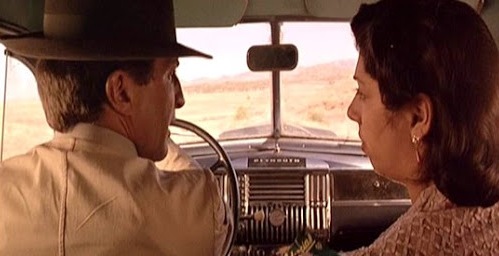 Mexican director Arturo Ripstein dramatizes the notorious “Lonelyhearts Killers” case, transposing it to 1940s Mexico, and depicting the matter-of-fact nature of evil.
Mexican director Arturo Ripstein dramatizes the notorious “Lonelyhearts Killers” case, transposing it to 1940s Mexico, and depicting the matter-of-fact nature of evil.
In Deep Crimson, the 1996 film by acclaimed Mexican director Arturo Ripstein, an overweight, depressed single mother named Coral (played by Regina Orozco) longs for romance. Through a personal ad, she meets and falls for a “Charles Boyer type” named Nicolas (played by Daniel Gimenez Cacho) who turns out to be a gigolo with a toupee. Undaunted, she declares her total love, gives her child up for adoption, and runs away with him. They hatch a scheme where they pose as brother and sister, he woos lonely widows with his charm, weds them, and then takes all their money. But Coral can’t stand to see other women enjoy her man’s attentions, so she kills them, and the couple end up going on a murder spree.
Ripstein is one of Mexico’s top film directors. He and his wife, screenwriter Paz Alicia Garciadiego, have taken the familiar true story of the “Lonelyhearts Killers,” which was made into a famous American film called The Honeymoon Killers in 1969, and adapted it to a 1940s Mexican setting. The film’s version is unsparingly dark. In Deep Crimson, the doomed couple must hold on to illusions about themselves in order to survive, even though they really know these illusions for what they are. Orozco gives a performance of monstrous fascination—Coral is ferociously needy, vulnerable to the point of madness, yet completely dominating her partner so as to keep him for herself. Cacho’s portrait of evil is just as disturbing in its furtiveness and submissive vacillation.
Ripstein’s style is almost austere at times, considering the lurid story, and the photography and set design are first rate. (In a bonus, the great Marisa Paredes does a scary turn as one of the victims.) The picture progresses from a kind of dark comedy to a truly horrifying story of desperate spiritual depravity. There is no redemption in Deep Crimson‘s world—the pathetic protagonists, in thrall to an obsessive love which can’t distinguish the real from fantasy, take a ride straight to hell with no chance of getting off.
In the film’s theatrical run, there were reports of massive walk-outs by audience members as the story gets grimmer. The truth is, Ripstein’s treatment is not sensational, but eerily matter of fact, and that, I suppose, is part of what makes it so disturbing. I guess you could say that this film is not for everybody, whatever that means. I was really shaken by it, haunted by its hopeless vision and admiring its craft. But then, I tend to like my movies black, without cream or sugar.
Deep Crimson is available on DVD.

The story of a young woman’s struggle with her overprotective mother, and her fascination with a woman directing her in an experimental theater group,...

Boots Riley’s free-wheeling, surrealistic satire on white supremacy and corporate culture sports a reckless take-no-prisoners attitude. Sorry to Bother You is the kind of...

Terrence Malick returns to his position as one of the greatest living film directors in this true story of an Austrian farmer who refuses...